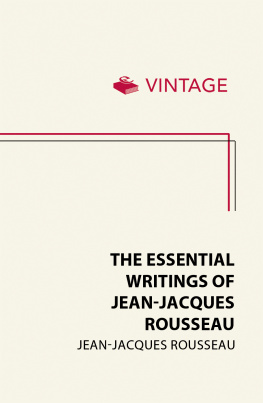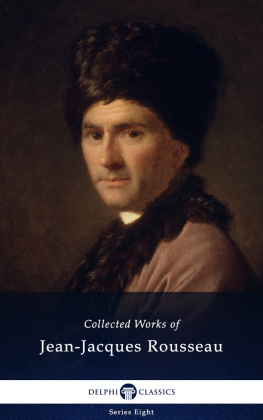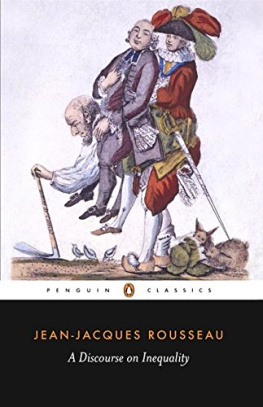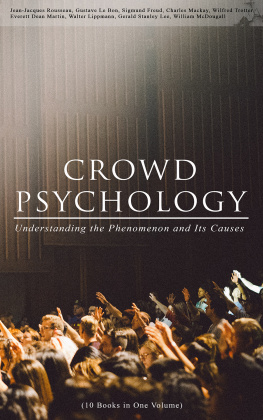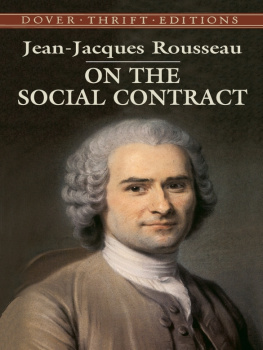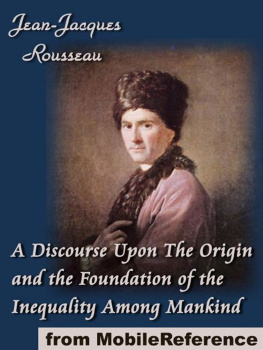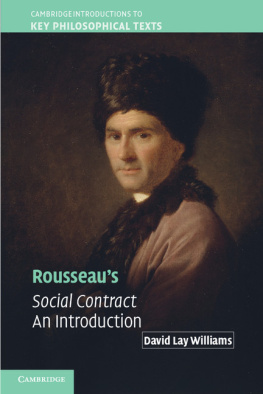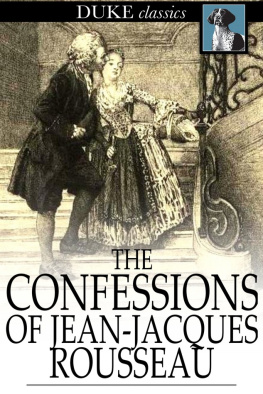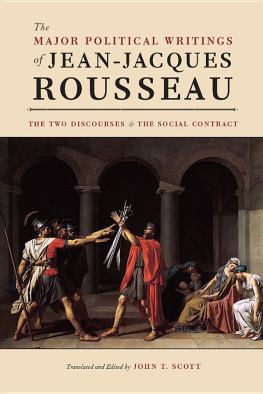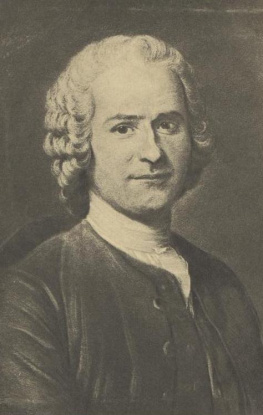Jean-Jacques Rousseau - The Essential Writings of Jean-Jacques Rousseau
Here you can read online Jean-Jacques Rousseau - The Essential Writings of Jean-Jacques Rousseau full text of the book (entire story) in english for free. Download pdf and epub, get meaning, cover and reviews about this ebook. year: 2013, publisher: Modern Library, genre: Science. Description of the work, (preface) as well as reviews are available. Best literature library LitArk.com created for fans of good reading and offers a wide selection of genres:
Romance novel
Science fiction
Adventure
Detective
Science
History
Home and family
Prose
Art
Politics
Computer
Non-fiction
Religion
Business
Children
Humor
Choose a favorite category and find really read worthwhile books. Enjoy immersion in the world of imagination, feel the emotions of the characters or learn something new for yourself, make an fascinating discovery.
- Book:The Essential Writings of Jean-Jacques Rousseau
- Author:
- Publisher:Modern Library
- Genre:
- Year:2013
- Rating:4 / 5
- Favourites:Add to favourites
- Your mark:
- 80
- 1
- 2
- 3
- 4
- 5
The Essential Writings of Jean-Jacques Rousseau: summary, description and annotation
We offer to read an annotation, description, summary or preface (depends on what the author of the book "The Essential Writings of Jean-Jacques Rousseau" wrote himself). If you haven't found the necessary information about the book — write in the comments, we will try to find it.
Jean-Jacques Rousseau: author's other books
Who wrote The Essential Writings of Jean-Jacques Rousseau? Find out the surname, the name of the author of the book and a list of all author's works by series.
The Essential Writings of Jean-Jacques Rousseau — read online for free the complete book (whole text) full work
Below is the text of the book, divided by pages. System saving the place of the last page read, allows you to conveniently read the book "The Essential Writings of Jean-Jacques Rousseau" online for free, without having to search again every time where you left off. Put a bookmark, and you can go to the page where you finished reading at any time.
Font size:
Interval:
Bookmark:
Jean-Jacques Rousseau was born in Geneva in 1712. He was a writer and political theorist of the Enlightenment. In 1750 he published his first important work A Discourse on the Sciences and the Arts (1750) where he argued that man had become corrupted by society and civilisation. In 1755, he published Discourse on the Origin of Inequality and in The Social Contract (1762) he argued, Man is born free, and everywhere he is in chains. This political treatise earned him exile from his home city of Geneva and arguably inspired the French Revolution (his ashes were transferred to the Pantheon in Paris in 1794). He also wrote mile, a treatise on education and The New Eloise (1761). This novel scandalised the French authorities who ordered Rousseaus arrest. In his last 10 years, Rousseau wrote his Confessions. In Confessions he remembers his adventurous life, his achievements and the persecution he suffered from opponents. His revelations inspired the likes of Proust, Goethe and Tolstoy among others. Rousseau died on 2 July in France in 1778.
Peter Constantines honours include the PEN Translation Prize, the National Translation Award, the Helen and Kurt Wolff Translation Prize, and Greeces Translators of Literature Prize. He translated Machiavellis The Prince for Vintage Classics.
The famous American publisher Alfred A. Knopf (18921984) founded Vintage Books in the United States in 1954 as a paperback home for the authors published by his company. Vintage was launched in the United Kingdom in 1990 and works independently from the American imprint although both are part of the international publishing group, Random House.
Vintage in the United Kingdom was initially created to publish paperback editions of books bought by the prestigious literary hardback imprints in the Random House Group such as Jonathan Cape, Chatto & Windus, Hutchinson and later William Heinemann, Secker & Warburg and The Harvill Press. There are many Booker and Nobel Prize-winning authors on the Vintage list and the imprint publishes a huge variety of fiction and non-fiction. Over the years Vintage has expanded and the list now includes both great authors of the past who are published under the Vintage Classics imprint as well as many of the most influential authors of the present. In 2012 Vintage Childrens Classics was launched to include the much-loved authors of our youth.
For a full list of the books Vintage publishes, please visit our website
www.vintage-books.co.uk
For book details and other information about the classic authors we publish, please visit the Vintage Classics website
www.vintage-classics.info
Discourse on the Arts and Sciences
Narcissus
Discourse on Political Economy
Pygmalion
Confessions
Constitutional Project for Corsica
Considerations on the Government of Poland
Essay on the Origin of Languages

This ebook is copyright material and must not be copied, reproduced, transferred, distributed, leased, licensed or publicly performed or used in any way except as specifically permitted in writing by the publishers, as allowed under the terms and conditions under which it was purchased or as strictly permitted by applicable copyright law. Any unauthorized distribution or use of this text may be a direct infringement of the authors and publishers rights and those responsible may be liable in law accordingly.
Version 1.0
Epub ISBN 9781448161980
www.randomhouse.co.uk
Published by Vintage 2013
Translation, compilation, and additional text copyright 2013 by Random House, Inc.,
Introduction copyright 2013 Leo Damrosch
Biographical note copyright 2013 by Peter Constantine
This edition published by arrangement with Modern Library, a division of Random House, Inc.
First published by Random House Inc. in 2013
Vintage
Random House, 20 Vauxhall Bridge Road,
London SW1V 2SA
www.vintage-classics.info
Addresses for companies within The Random House Group Limited can be found at: www.randomhouse.co.uk/offices.htm
The Random House Group Limited Reg. No. 954009
A CIP catalogue record for this book is available from the British Library
ISBN 9781448161980
www.vintage-classics.info
Visit www.worldofstories.co.uk for all your favourite childrens classics
Jean-Jacques Rousseau was born in Geneva on June 28, 1712. His father, Isaac Rousseau, was a skilled watchmaker, and his mother, Suzanne, the daughter of a prominent Calvinist clergyman. Tragically, she contracted an infection and died a few days later. Jean-Jacques and his older brother, Franois, were cared for thereafter by their fathers sister, also named Suzanne.
Rousseau never went to school, but was taught to read and write at home. When he was ten his father withdrew from his life, leaving Geneva after a confrontation with a haughty patrician, and he was sent to board with a clergyman in the nearby village of Bossey. At thirteen it was time to begin work, and he was apprenticed to a young engraver who proved abusive. Rousseau in turn became lazy and dishonest, and at sixteen, on the spur of the moment, he ran away from Geneva for good.
In the cathedral town of Annecy, in the Savoy region to the south of the city, he made the most important acquaintance of his life. An intelligent, beautiful young woman named Mme de Warens, who had left her husband in Switzerland, took an interest in him and sent him to Turin for instruction in the Catholic faith. (At that time Turin, in the Italian Piedmont, was the capital of the Kingdom of Sardinia, whose western province was the French-speaking Savoy.) For a year Rousseau held several low-level jobs, and then resolved to go back to Annecy. Mme de Warens now took him under her wing, and he lived with her for the next nine years. He always called her Maman, as though she were the mother he had lost when he was born, and he was greatly alarmed when she initiated a sexual relationship.
In his autobiographical Confessions Rousseau would recall this period as idyllic, but actually he was lonely and depressed much of the time. He did manage to acquire some skill in music, and he began to read voraciously under the guidance of Mme de Warens and her circle of congenial priests. But eventually it became clear that he would have to move on, and he proceeded to Lyon, where he took a position as tutor to two small boys. The tutoring didnt go well, but he formed important friendships with several members of the family, and they helped him to make valuable contacts when in 1742 he moved to Paris, hoping to make a career as a musician.
Unexpectedly, Rousseau was offered a post as secretary to the French ambassador in Venice, where he discovered administrative talents he didnt know he had and formed a passionate attachment to the emotional lyricism of Italian music. A year later there was a falling-out with his aristocratic employer, and he returned to Paris, where two significant relationships began. One was with the brilliant intellectual Denis Diderot, roughly the same age but well educated and already prominent, who was editing the immensely ambitious Encyclopdie
Font size:
Interval:
Bookmark:
Similar books «The Essential Writings of Jean-Jacques Rousseau»
Look at similar books to The Essential Writings of Jean-Jacques Rousseau. We have selected literature similar in name and meaning in the hope of providing readers with more options to find new, interesting, not yet read works.
Discussion, reviews of the book The Essential Writings of Jean-Jacques Rousseau and just readers' own opinions. Leave your comments, write what you think about the work, its meaning or the main characters. Specify what exactly you liked and what you didn't like, and why you think so.

